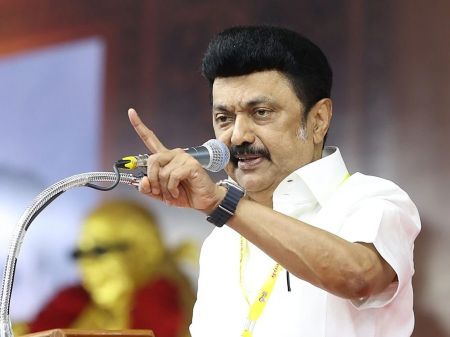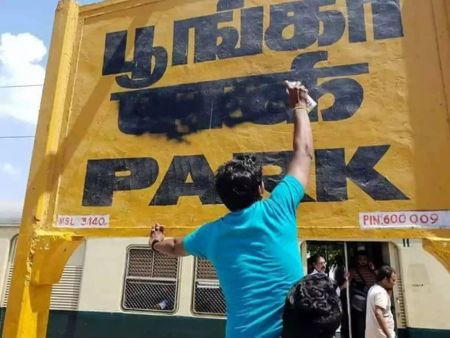Stalin’s Fierce Opposition to the Three-Language Policy and the Politics of Linguistic Identity
THE TAMIL NADU Nadu Chief Minister, M.K. Stalin, in a recent vitriolic outburst, has lashed out against the three-language formula in the National Education Policy, 2020, calling it “Hindi colonialism.”
The same view has been reiterated in greater detail by Tamil Nadu’s Minister for IT and Digital Services, Mr. Palanivel Thiaga Rajan, in a recent interview with Karan Thapar.

M. K . Stalin
I completely agree that there should be no imposition of Hindi in Tamil Nadu or any other state. In fact, the foolish attempt by some North Indian politicians to impose Hindi in the 1960s resulted in a strong reaction in Tamil Nadu and other South Indian states, where people who were previously learning Hindi voluntarily stopped doing so.
However, statements made by politicians should be taken with a pinch of salt. After all, they have to consider the next elections and keep their vote bank intact.
I have repeatedly told Tamilians that, while I am strongly against the imposition of Hindi, they should voluntarily learn it, as it is in their own interest. My reasons have been detailed in these articles, so I will not repeat them here.
I have always maintained that I am merely suggesting that South Indians learn Hindi. If my suggestion makes sense, it may be accepted; if not, it can be ignored. What is wrong with that? Yet, many Tamilians and other South Indians are so sensitive about this issue that they consider even a mere suggestion to be an attempt at imposition.

Anti Hindi
Very well, then—I request North Indians not to even make the suggestion, as it seems to upset them. However, I am confident that Tamilians and other South Indians, being intelligent people, will realize that learning Hindi is in their best interest and will take it up on their own.
I will conclude by narrating two incidents.
When I was Chief Justice of the Madras High Court (2004–2005), I once visited a shop in Madurai and overheard a Tamilian shopkeeper conversing fluently in Hindi with a customer.
Surprised, I asked him in Tamil (which I had learned a little), “Evvalavu nalla Hindi pesreenga eppadi?” (How are you speaking such good Hindi?). He replied in Hindi that while politicians have their own agenda, he has to do business, and many of his customers are Hindi speakers—so he had to learn Hindi.
 The second incident also occurred during my tenure as Chief Justice of the Madras High Court. I was invited to deliver a talk at Gulbarga University in Karnataka. I took a flight from Chennai to Hyderabad, from where I travelled by taxi to Gulbarga. A professor from the university had come to Hyderabad to accompany me.
The second incident also occurred during my tenure as Chief Justice of the Madras High Court. I was invited to deliver a talk at Gulbarga University in Karnataka. I took a flight from Chennai to Hyderabad, from where I travelled by taxi to Gulbarga. A professor from the university had come to Hyderabad to accompany me.
On the way, I heard the professor and the taxi driver—both South Indians—speaking in Hindi. I was surprised and asked the professor why. He explained that he knew Kannada while the taxi driver spoke Telugu, but since they did not know each other’s language, they conversed in Hindi as their link language.
Thus, Hindi is already serving as a link language in large parts of India. I am certain that South Indians, being intelligent people, will learn Hindi on their own, as it is in their best interest. No one needs to tell them to do so. ![]()
Main Illustration Courtesy- Dominic Xavier/Rediff.com
Disclaimer : PunjabTodayNews.com and other platforms of the Punjab Today group strive to include views and opinions from across the entire spectrum, but by no means do we agree with everything we publish. Our efforts and editorial choices consistently underscore our authors’ right to the freedom of speech. However, it should be clear to all readers that individual authors are responsible for the information, ideas or opinions in their articles, and very often, these do not reflect the views of PunjabTodayNews.com or other platforms of the group. Punjab Today does not assume any responsibility or liability for the views of authors whose work appears here.
Punjab Today believes in serious, engaging, narrative journalism at a time when mainstream media houses seem to have given up on long-form writing and news television has blurred or altogether erased the lines between news and slapstick entertainment. We at Punjab Today believe that readers such as yourself appreciate cerebral journalism, and would like you to hold us against the best international industry standards. Brickbats are welcome even more than bouquets, though an occasional pat on the back is always encouraging. Good journalism can be a lifeline in these uncertain times worldwide. You can support us in myriad ways. To begin with, by spreading word about us and forwarding this reportage. Stay engaged.
— Team PT

